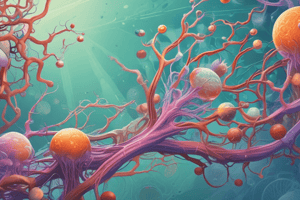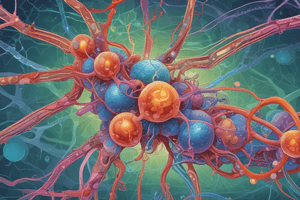Podcast
Questions and Answers
______, the study of living organisms and their interactions with the world around them, is a broad and interdisciplinary field that offers a wealth of knowledge and opportunities for exploration.
______, the study of living organisms and their interactions with the world around them, is a broad and interdisciplinary field that offers a wealth of knowledge and opportunities for exploration.
Biology
Cell biology, a scientific field that focuses on the structure, function, and processes of ______, is integral to understanding all living organisms.
Cell biology, a scientific field that focuses on the structure, function, and processes of ______, is integral to understanding all living organisms.
cells
______ are the smallest units of life, and they come in many forms and varieties, with an estimated 200 cell types within the human body alone.
______ are the smallest units of life, and they come in many forms and varieties, with an estimated 200 cell types within the human body alone.
Cells
Plasma membrane: The outermost layer that surrounds the ______ and serves as a selective barrier for the movement of molecules.
Plasma membrane: The outermost layer that surrounds the ______ and serves as a selective barrier for the movement of molecules.
The ______ is the control center of the cell, containing the cell's genetic material (DNA)
The ______ is the control center of the cell, containing the cell's genetic material (DNA)
Specialized structures within the cell that perform specific functions, such as the mitochondria (energy production) or chloroplasts (photosynthesis) are called ______
Specialized structures within the cell that perform specific functions, such as the mitochondria (energy production) or chloroplasts (photosynthesis) are called ______
A network of fibrous proteins that provides structural support and shape to the cell is called ______
A network of fibrous proteins that provides structural support and shape to the cell is called ______
There are two main forms of cell division: mitosis and ______
There are two main forms of cell division: mitosis and ______
Cells communicate with one another and coordinate their actions through the release of signaling molecules called ______
Cells communicate with one another and coordinate their actions through the release of signaling molecules called ______
Chemical messengers that transmit signals between nerve cells (neurons) are called ______
Chemical messengers that transmit signals between nerve cells (neurons) are called ______
Flashcards are hidden until you start studying
Study Notes
Exploring the Fascinating World of Biology: A Deep Dive into Cell Biology
Biology, the study of living organisms and their interactions with the world around them, is a broad and interdisciplinary field that offers a wealth of knowledge and opportunities for exploration. In this article, we'll focus on one of the most fundamental aspects of biology: cell biology.
Cell Biology: The Foundation of Life
Cell biology, a scientific field that focuses on the structure, function, and processes of cells, is integral to understanding all living organisms. Cells are the smallest units of life, and they come in many forms and varieties, with an estimated 200 cell types within the human body alone.
Cells are the basic building blocks of all living things:
- Prokaryotes: Bacteria and archaea are the simplest cells, without a nucleus or membrane-bound organelles, and they carry out their metabolism in the cytoplasm.
- Eukaryotes: These cells possess a nucleus and membrane-bound organelles, and they are found in plants, animals, fungi, and protists.
Cell Structure and Organization
Cells are complex, dynamic structures that exhibit a wide range of structural components. Here are some key features of cell structure:
- Plasma membrane: The outermost layer that surrounds the cell and serves as a selective barrier for the movement of molecules.
- Cytoplasm: The viscous, gel-like substance that fills the cell and contains many of the cell's organelles and other components.
- Nucleus: The control center of the cell, containing the cell's genetic material (DNA).
- Organelles: Specialized structures within the cell that perform specific functions, such as the mitochondria (energy production) or chloroplasts (photosynthesis).
- Cytoskeleton: A network of fibrous proteins that provides structural support and shape to the cell.
Cell Division and Reproduction
Cell division is a crucial process for growth, development, and repair in living organisms. There are two main forms of cell division: mitosis and meiosis.
- Mitosis: A process that results in two genetically identical daughter cells, each with the same number of chromosomes as the parent cell. This process is vital for growth, development, and repair.
- Meiosis: A specialized form of cell division that results in four genetically distinct haploid daughter cells. Meiosis is the process responsible for producing gametes (sperm and egg cells) in sexual reproduction.
Cell Communication and Signaling
Cells communicate with one another and coordinate their actions through the release of signaling molecules called hormones and neurotransmitters. These molecules are essential for processes such as growth, differentiation, and adaptation.
- Hormones: Chemical messengers produced by endocrine cells and secreted into the bloodstream to regulate the activity of target cells.
- Neurotransmitters: Chemical messengers that transmit signals between nerve cells (neurons).
Challenges and Future Directions in Cell Biology
While cell biology has made incredible strides in understanding the molecular basis of life, there are still many open questions and challenges to be addressed. Some of these include:
- Epigenetics: The study of modifications to DNA and its associated proteins that can change gene expression and function without altering the underlying DNA sequence.
- Stem cells: Cells that have the potential to develop into any cell type in the body. Understanding stem cell biology could lead to new treatments for a wide range of diseases and conditions.
- Cellular senescence: The process by which cells lose their ability to divide and function properly as they age. Understanding this process could help develop strategies to delay aging and age-related diseases.
The field of cell biology continues to expand rapidly, and new discoveries and insights are being made every day. By studying the structure, function, and processes of cells, we can better understand the complexities of life and the world around us.
Studying That Suits You
Use AI to generate personalized quizzes and flashcards to suit your learning preferences.




